Unit 1 Friends 汉译英 专练(含解析)牛津译林版英语八年级上册
文档属性
| 名称 | Unit 1 Friends 汉译英 专练(含解析)牛津译林版英语八年级上册 | 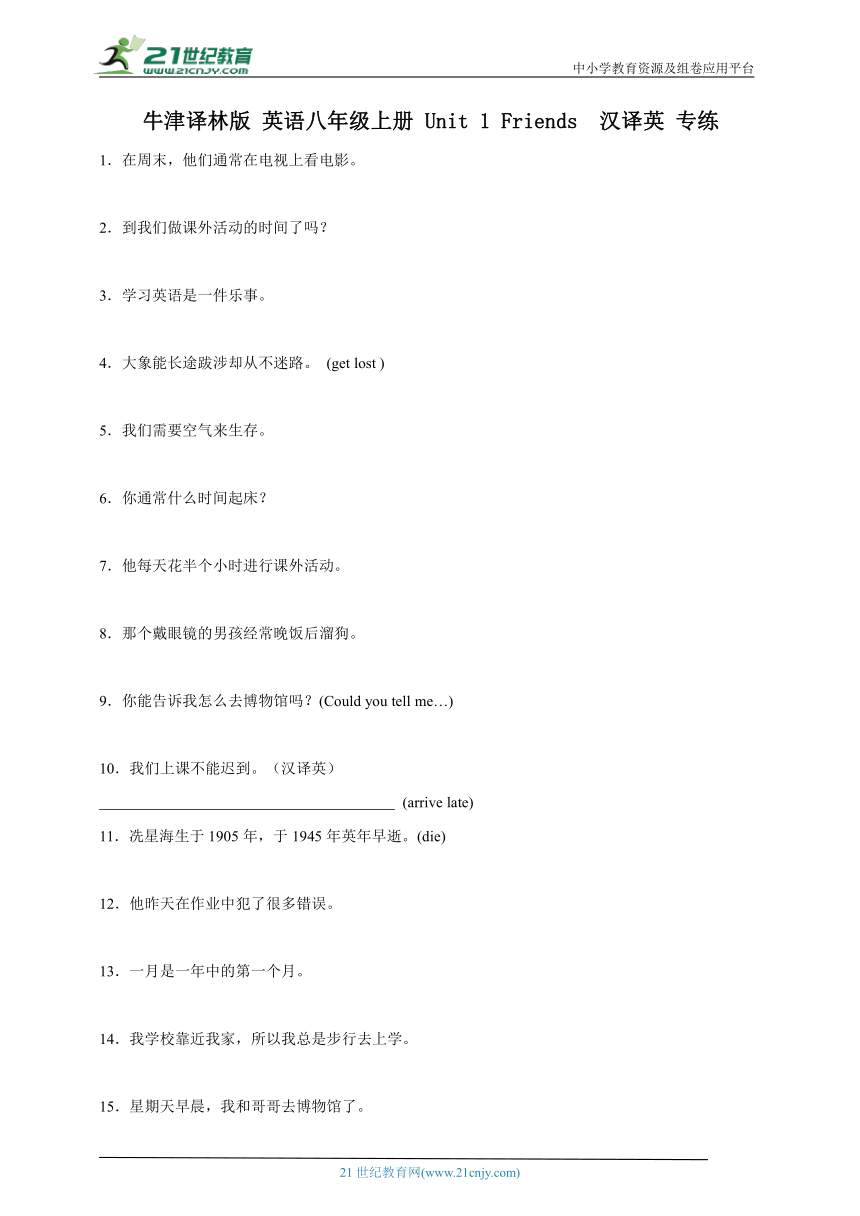 | |
| 格式 | docx | ||
| 文件大小 | 286.7KB | ||
| 资源类型 | 试卷 | ||
| 版本资源 | 牛津译林版 | ||
| 科目 | 英语 | ||
| 更新时间 | 2023-09-19 16:13:05 | ||
图片预览

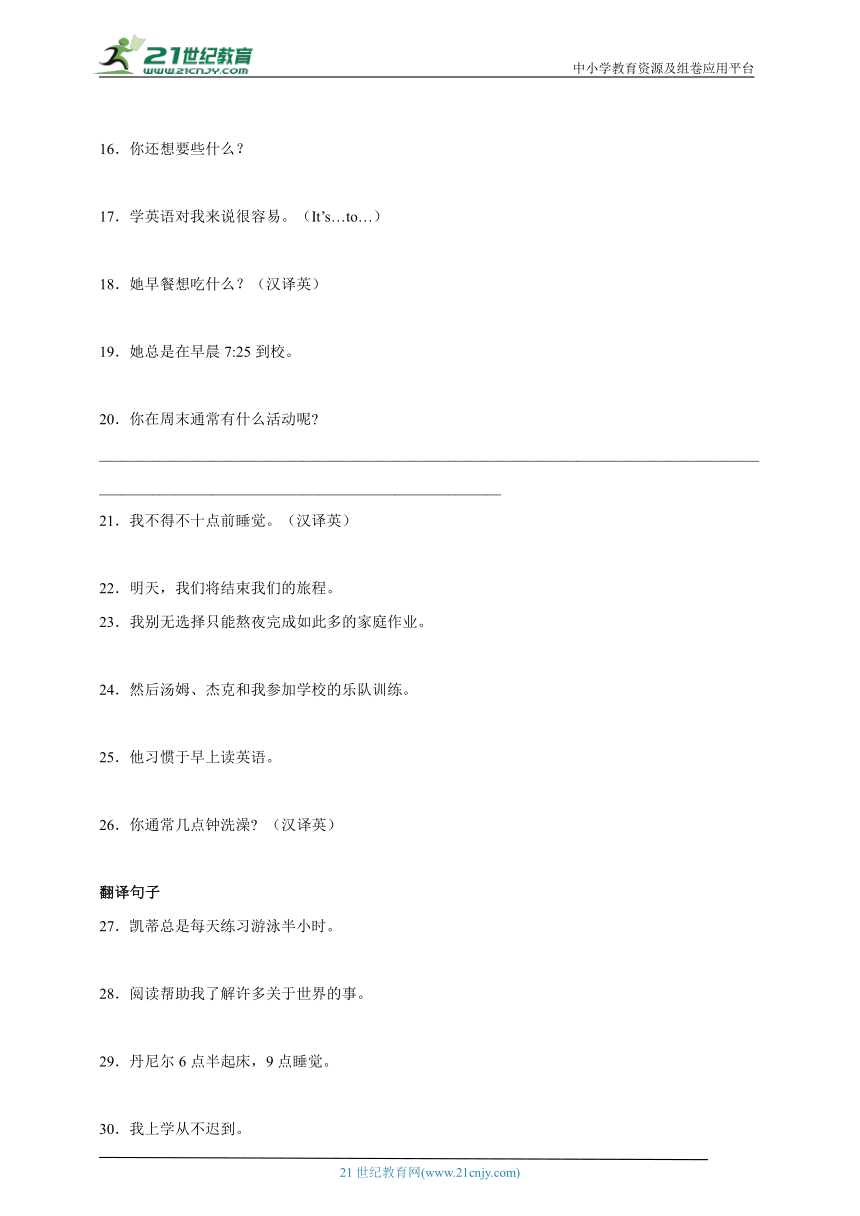
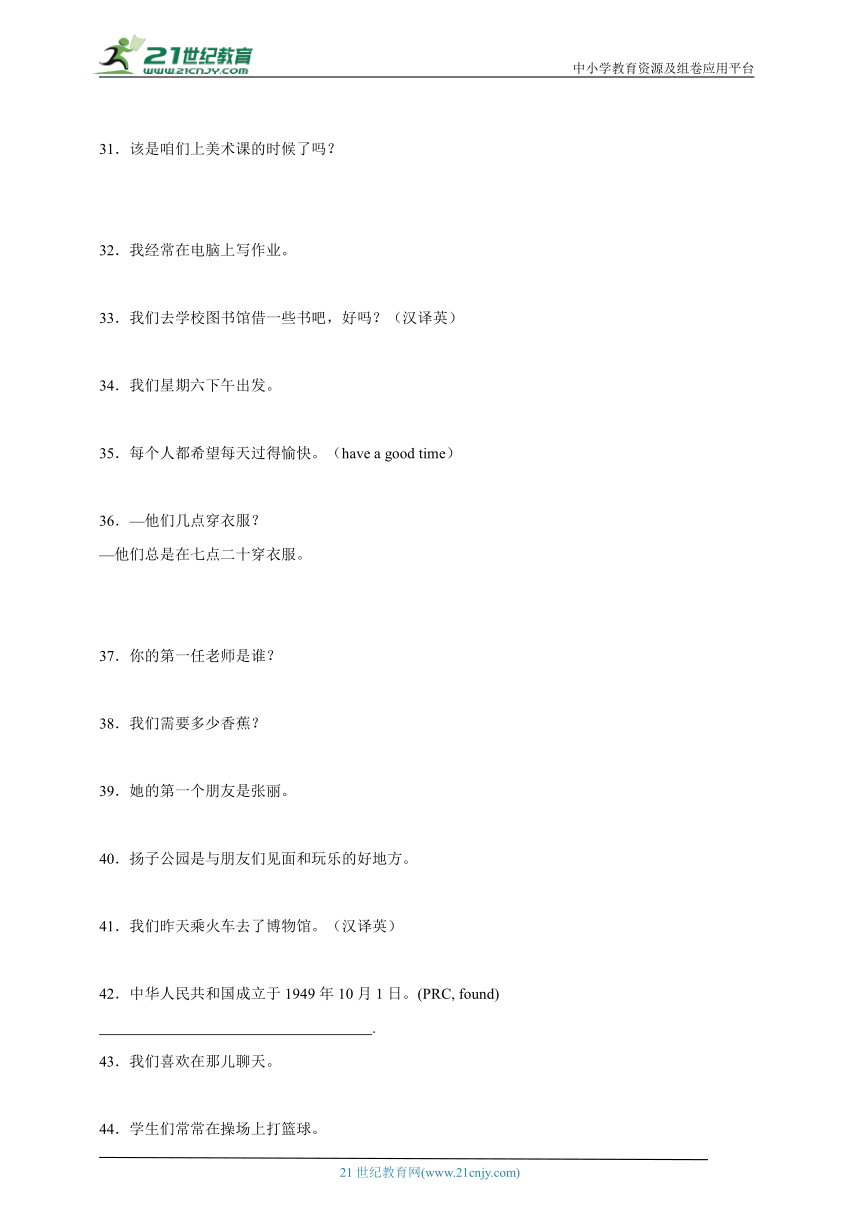
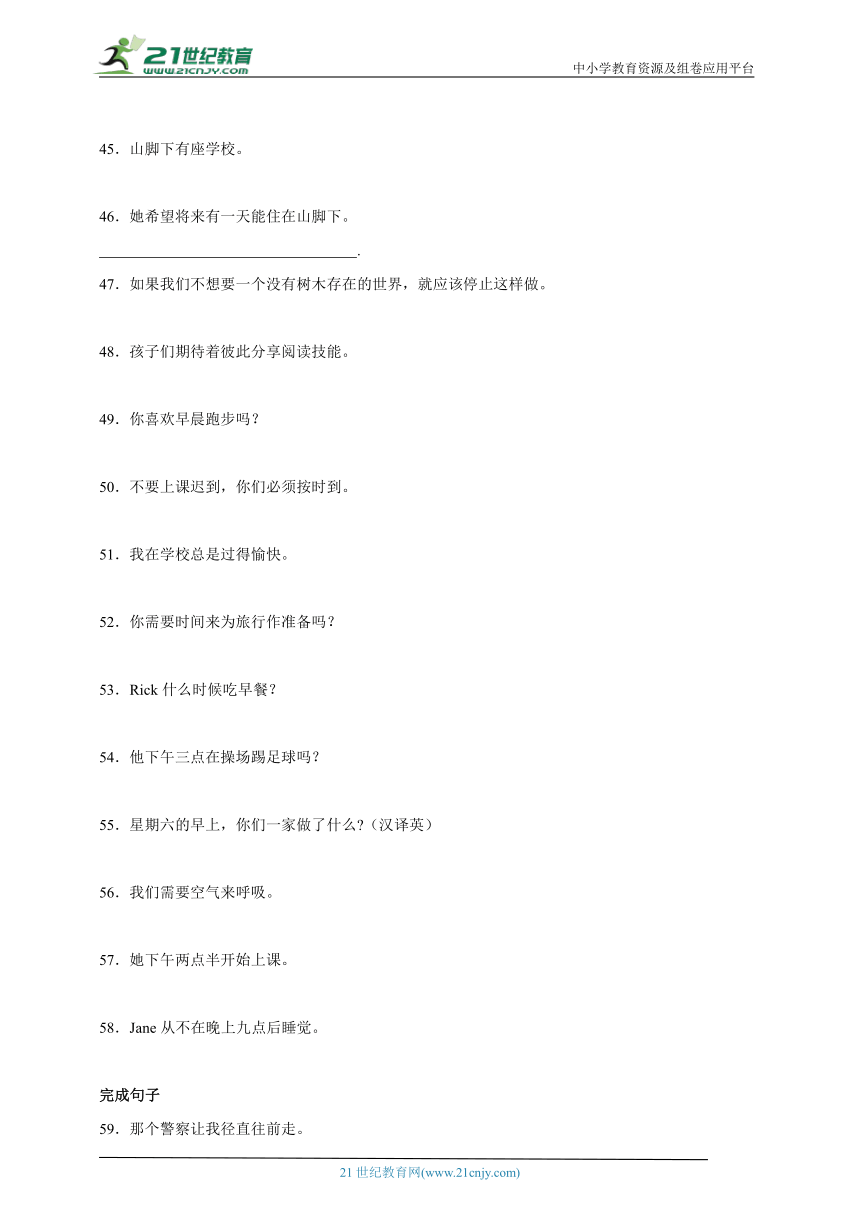
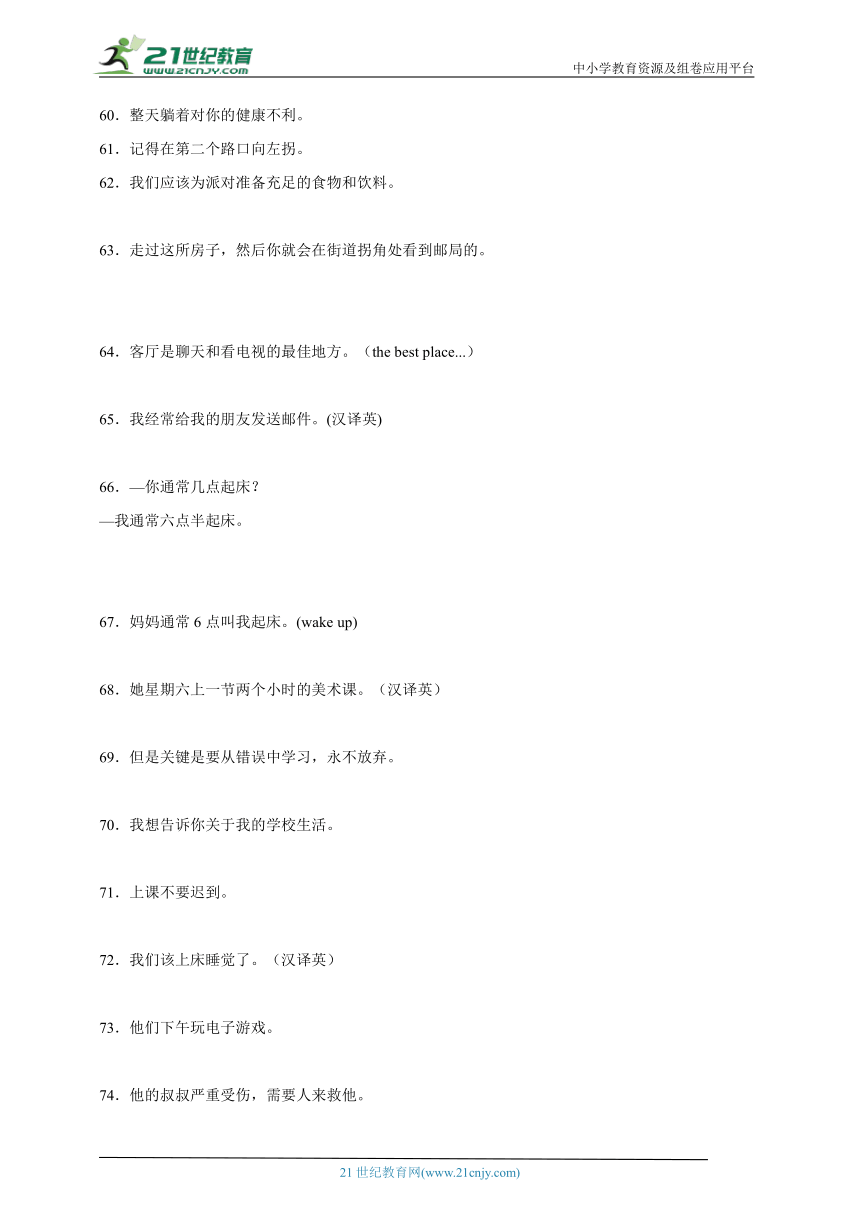
文档简介
中小学教育资源及组卷应用平台
牛津译林版 英语八年级上册 Unit 1 Friends 汉译英 专练
1.在周末,他们通常在电视上看电影。
2.到我们做课外活动的时间了吗?
3.学习英语是一件乐事。
4.大象能长途跋涉却从不迷路。 (get lost )
5.我们需要空气来生存。
6.你通常什么时间起床?
7.他每天花半个小时进行课外活动。
8.那个戴眼镜的男孩经常晚饭后溜狗。
9.你能告诉我怎么去博物馆吗?(Could you tell me…)
10.我们上课不能迟到。(汉译英)
(arrive late)
11.冼星海生于1905年,于1945年英年早逝。(die)
12.他昨天在作业中犯了很多错误。
13.一月是一年中的第一个月。
14.我学校靠近我家,所以我总是步行去上学。
15.星期天早晨,我和哥哥去博物馆了。
16.你还想要些什么?
17.学英语对我来说很容易。(It’s…to…)
18.她早餐想吃什么?(汉译英)
19.她总是在早晨7:25到校。
20.你在周末通常有什么活动呢
____________________________________________________________________________________________________________________________________________
21.我不得不十点前睡觉。(汉译英)
22.明天,我们将结束我们的旅程。
23.我别无选择只能熬夜完成如此多的家庭作业。
24.然后汤姆、杰克和我参加学校的乐队训练。
25.他习惯于早上读英语。
26.你通常几点钟洗澡 (汉译英)
翻译句子
27.凯蒂总是每天练习游泳半小时。
28.阅读帮助我了解许多关于世界的事。
29.丹尼尔6点半起床,9点睡觉。
30.我上学从不迟到。
31.该是咱们上美术课的时候了吗?
32.我经常在电脑上写作业。
33.我们去学校图书馆借一些书吧,好吗?(汉译英)
34.我们星期六下午出发。
35.每个人都希望每天过得愉快。(have a good time)
36.—他们几点穿衣服?
—他们总是在七点二十穿衣服。
37.你的第一任老师是谁?
38.我们需要多少香蕉?
39.她的第一个朋友是张丽。
40.扬子公园是与朋友们见面和玩乐的好地方。
41.我们昨天乘火车去了博物馆。(汉译英)
42.中华人民共和国成立于1949年10月1日。(PRC, found)
.
43.我们喜欢在那儿聊天。
44.学生们常常在操场上打篮球。
45.山脚下有座学校。
46.她希望将来有一天能住在山脚下。
.
47.如果我们不想要一个没有树木存在的世界,就应该停止这样做。
48.孩子们期待着彼此分享阅读技能。
49.你喜欢早晨跑步吗?
50.不要上课迟到,你们必须按时到。
51.我在学校总是过得愉快。
52.你需要时间来为旅行作准备吗?
53.Rick什么时候吃早餐?
54.他下午三点在操场踢足球吗?
55.星期六的早上,你们一家做了什么 (汉译英)
56.我们需要空气来呼吸。
57.她下午两点半开始上课。
58.Jane从不在晚上九点后睡觉。
完成句子
59.那个警察让我径直往前走。
60.整天躺着对你的健康不利。
61.记得在第二个路口向左拐。
62.我们应该为派对准备充足的食物和饮料。
63.走过这所房子,然后你就会在街道拐角处看到邮局的。
64.客厅是聊天和看电视的最佳地方。(the best place...)
65.我经常给我的朋友发送邮件。(汉译英)
66.—你通常几点起床?
—我通常六点半起床。
67.妈妈通常6点叫我起床。(wake up)
68.她星期六上一节两个小时的美术课。(汉译英)
69.但是关键是要从错误中学习,永不放弃。
70.我想告诉你关于我的学校生活。
71.上课不要迟到。
72.我们该上床睡觉了。(汉译英)
73.他们下午玩电子游戏。
74.他的叔叔严重受伤,需要人来救他。
75.我们知道怎样娱乐。
76.早饭能帮助我们为一天做好准备。
77.客厅是聊天和看电视的最佳地方。
78.他的生日是十二月二十五号。
.
参考答案:
1.They usually watch movies on TV on weekends.
【详解】在周末:on weekends;他们:they;通常:usually;在电视上:on TV;看电影:watch movies。结合语境可知,句子时态为一般现在时。“在周末”为时间状语,故放在句末。由于主语是“他们”故谓语动词用动词原形。故填They usually watch movies on TV on weekends.
2.Is it time for us to do after-school activities
【详解】根据汉语提示可知此句为一般疑问句,时态为一般现在时。“到某人做某事的时间了”用句型“It is time for sb to do sth”,一般疑问句应将be动词“is”提前,首字母大写;“某人”是“我们”,位于“for”后面应用宾格“us”;“做某事”是“做课外活动”,译为“do after-school activities”。故填Is it time for us to do after-school activities
3.Learning English is great fun./It is fun to learn English.
【详解】根据汉语句意,可知句子是主系表结构;“学习英语”learn English,因其在句首作主语因此用动名词形式learning,且首字母要大写,动名词短语作主语,be动词用is;“乐事”great fun;该句也可以用固定句型:It is+形容词或名词+to do sth.意为“做某事怎么样”,其中it作形式主语,代替后面的不定式to do sth.(真正主语)。故填Learning English is great fun./It is fun to learn English.
4.Elephants can walk for a long time and never get lost.
【详解】大象能长途跋涉却从不迷路。 (get lost ) 根据walk for a long time走很长时间,get lost迷路,never从不,用一般现在时态,名词复数表示一类,主语用复数形式;故答案是:Elephants can walk for a long time and never get lost.
5.We need air to live.
【详解】我们:we,作主语,位于句首,首字母大写;需要:need,作谓语动词;空气:air,不可数名词作宾语;来生存:to live,动词不定式。此句陈述的是客观事实,用一般现在时态,主语为复数,谓语动词用原形。故填We need air to live.
6.What time do you usually get up
【详解】“什么时间”为what time,特殊疑问词;“你”为you;“通常”为usually;“起床”为get up。结合语境可知,此题为一般现在时,主语“you”是第二人称,故疑问句的助动词应用do。故填What time do you usually get up
7.It takes him half an hour to do after-school activities every day./He spends half an hour doing after-school activities every day.
【详解】根据“每天”可知用一般现在时。做某事花费某人多少时间It takes sb. some time to do sth.;某人花费多少时间做某事sb. spends some time doing sth.;他,作主语时译为he,作宾语时译为him;半个小时half an hour;进行课外活动do after-school activities;每天every day。故填It takes him half an hour to do after-school activities every day./He spends half an hour doing after-school activities every day.
8.The boy with/wearing glasses often walks the dog after supper/dinner. 或The boy with/wearing glasses often takes the dog for a walk after supper/dinner.
【详解】那个男孩:the boy;戴眼镜的:with/wearing glasses;经常:often;在晚饭后:after supper/dinner;遛狗:walk the dog/take the dog for a walk。结合语境可知,句子时态为一般现在时。此处“戴眼镜的”修饰“那个男孩”,要放在其后作后置定语,the boy中首字母t要大写,由于句子主语是“那个男孩”,为第三人称单数,故谓语动词“遛狗”要用三单形式,即walks the dog或takes the dog for a walk,“在晚饭后”为时间状语,放于句末,“经常”表频率,放在谓语动词前。故填The boy with/wearing glasses often walks the dog after supper/dinner. 或The boy with/wearing glasses often takes the dog for a walk after supper/dinner.
9.Could you tell me how to get to the museum
【详解】“你能告诉我……吗”Could you tell me…;“怎么”how;“去博物馆”get to the museum。“疑问词+动词不定式”作tell的直接宾语。故填Could you tell me how to get to the museum
10.We can’t arrive/be late for class.
【详解】arrive/be late for class“上课迟到”,can’t“不能”,后接动词原形,故填We can’t arrive/be late for class.
11.Xian Xinghai was born in 1905, died young in 1945.
【详解】be born表示“出生”,通常用于一般过去时,主语Xian Xinghai为第三人称单数,be动词用was;die young表示“英年早逝”,时态为一般过去时,动词用过去式;时间介词in后接年份。故填Xian Xinghai was born in 1905, died young in 1945.
12.He made many mistakes in his homework yesterday.
【详解】根据汉语可知,本句时态是一般过去时;他:he,在句中作主语;犯了很多错误:make many mistakes,make的过去式made;在他的作业中:in his homework,昨天:yesterday,在句中作时间状语。故填He made many mistakes in his homework yesterday.
13.January is the first month of a year.
【详解】January“一月”,作主语;is“是”,系动词;the first month of a year“一年中的第一个月”,作表语。故填January is the first month of a year.
14.My school is close to my home, so I always go to school on foot./ My school is close to my home, so I always walk to school.
【详解】My school 表示“我的学校”,作主语,单数,系动词用is:close to表示“接近……”;always表示“总是”,频度副词;walk to school和go to school on foot是同义短语,都表示“步行去上学”。故填My school is close to my home, so I always go to school on foot./ My school is close to my home, so I always walk to school.
15.On Sunday morning, my brother and I went to the museum.
【详解】星期天早晨:on Sunday morning,此处句子用一般过去时;主语是my brother and I;去博物馆:go to the museum。go的过去式是went。故填On Sunday morning, my brother and I went to the museum.
16.What else do you want /What else would you like
【详解】“其他什么”为What else;“想要”为want/would like,you“你”是第二人称,疑问句借助于助动词do,故填What else do you want /What else would you like
17.It’s easy for me to learn English.
【详解】根据句意可知,句子时态为一般现在时态的陈述句。句子主语:学英语,用动词不定式to learn English来表达,因其太长,若放于句首,句子显得头重脚轻,所以用形式主语it来代替,把真正的主语“动词不定式”放于句末;谓语动词是系动词is ;表语为容易的,easy;介词短语“对我来说for me”置于表语之后。故答案为It’s easy for me to learn English.
18.What would she like for breakfast
【详解】根据汉语可知,本句是what“什么”引导的特殊疑问句,“她”she;“想要”would like;“早餐吃……”for breakfast。故填What would she like for breakfast
19.She always arrives at school at 7:25 a.m..
【详解】she“她”,主格作主语;always“总是”,频度副词,也是一般现在时的标志词,arrive at school“到达学校”,主语是第三人称单数形式,动词用三单形式,at 7:25 a.m.“在早晨7:25”,具体的钟点前用介词at,故填She always arrives at school at 7:25 a.m..
20.What activity do you usually have on weekends
【详解】what activity“什么活动”;have“有”;usually“通常”;on weekends“在周末”,这是一个特殊疑问句,结构为:特殊疑问词+一般疑问句,句子是一般现在时,主语you是第二人称,将助动词do放在主语you前,故填What activity do you usually have on weekends
21.I have to sleep/go to bed before 10 o’clock.
【详解】根据汉语可知,本句时态是一般现在时;主语是“我”I,谓语动词用原形;“不得不做某事”have to do sth;“睡觉”sleep/go to bed;“十点前”before 10 o’clock。故填I have to sleep/go to bed before 10 o’clock.
22.Tomorrow, we will (shall) end our journey/ Tomorrow, we are going to end our journey
【详解】明天:tomorrow;我们:we;结束我们的旅程:end our journey。根据语境(tomorrow)可知,此题为一般将来时,其结构为be going to/will (shall) do sth.,主语we是复数,因此be用are。故填Tomorrow, we will (shall) end our journey/ Tomorrow, we are going to end our journey。
23.I have/had no choice but to stay up (late) to complete/finish so much homework.
【详解】have no choice but todo 表示只能做…… 别无选择;stay up表示熬夜;to complete/finish so much homework. 动词不定式表示目的;complete/finish so much homework.表示完成如此多的作业;根据汉语提示,故填I have/had no choice but to stay up (late) to complete/finish so much homework.
24.Then Tom, Jack and I take part in the school band practice.
【详解】then“然后”;Tom, Jack and I“汤姆、杰克和我”;take part in“参加”;the school band practice“学校的乐队训练”。结合语境可知,此题为一般现在时,主语“Tom, Jack and I”为复数,谓语动词take应用原形。故填Then Tom, Jack and I take part in the school band practice.
25.He is used to reading English in the morning.
【详解】he“他”;be used to doing sth“习惯做某事”;read English“读英语”;in the morning“在早上”。故填He is used to reading English in the morning.
26.What time do you usually take a shower/bath
【详解】句子是特殊疑问句,几点钟:what time;洗澡:take a shower/bath;句子用一般现在时,主语是you,变疑问句时借助助动词do,后加动词原形;通常:usually,放实义动词之前。故填What time do you usually take a shower/bath
27.Kitty always practises swimming for half an hour every day. 28.Reading helps me learn a lot about the world. 29.Daniel gets up at half past 6 and go to bed at 9. 30.I’m never late for school. 31.Is it time for us to have our Art lesson
【解析】27.根据句意可知,这句话讲述的是经常性的动作,应用一般现在时态,主语Kitty是第三人称单数,故谓语动词practise要加s,它常用于句型practise doing sth.练习做某事。for half an hour是介词短语,for后跟一段时间。
28.句中主语是Reading,动名词形式;help sb. do sth.帮助某人做某事;learn about…了解,a lot 相当于副词,修饰动词learn。
29.根据句意可知,这句话讲述的是经常性的动作,应用一般现在时态,主语Daniel是第三人称单数,故谓语动词get up和go to bed都要用三单形式,这是两个固定短语。
30.never从不,是一个否定副词,放在be动词后面;be late for school上学迟到,是固定短语。根据句意可知,这句话应用一般现在时态,主语是I,be动词应该用am。
31.句中使用了句型it is time for sb. to do sth.到了某人做某事的时候了,根据句意可知,这是一般疑问句,故将be动词提前;have art lesson上美术课,固定短语。
32.I often write my homework on the computer.
【详解】write one’s homework“做作业”,on the computer“在电脑上”,故填I often write my homework on the computer.
33.Shall we go to the school library and borrow some books
【详解】我们去做某事好吗:shall we do sth.;去学校图书馆:go to the school library;借一些书:borrow some books,此处是希望得到肯定回答的疑问句,用some表示“一些”;两个动作表示并列,用and连接。故填Shall we go to the school library and borrow some books
34.We’ll start on Saturday afternoon.
【详解】根据句意可知,此句是一般将来时态的肯定陈述句。此句故翻译为We’ll start on Saturday afternoon.
35.Everyone hopes to have a good time every day.
【详解】本句为陈述句,“每个人”everyone,“希望做某事”hope to do,“过得愉快”have a good time,“每天”every day。everyone作主语,谓语动词用三单。故填Everyone hopes to have a good time every day.
36. —What time do they get dressed —They always get dressed at seven twenty.
【详解】询问“几点”用What time ;穿衣服:get dressed;七点二十:seven twenty。根据汉语句子,考查特殊疑问词“几点”What time;“总是”always和在具体时间点前的介词at的用法。主语为they,疑问句要引入助动词do。故填:①—What time do they get dressed ②—They always get dressed at seven twenty.
37.Who was your first teacher
【详解】这是一个特殊疑问句,疑问词应用who“谁”;first teacher“第一任老师”,your“你的”。根据句意可知,该句应用一般过去时态,be动词用was。故答案为Who was your first teacher
38.How many bananas do we need
【详解】根据汉语可知,本句是特殊疑问句,“香蕉”banana,可数名词,所以用how many表示“多少”,后跟可数名词复数;“我们”we,作主语,助动词用do,放在主语之前构成疑问语序,“需要”need。故填How many bananas do we need
39.Her first friend is Zhang Li.
【详解】Her first friend她的第一个朋友,is是,Zhang Li张丽。故填Her first friend is Zhang Li.
40.Yangzi Park is a good place to meet friends and have fun.
【详解】“扬子公园”为Yangzi Park;“是”为be;“一个好地方”为a good place;“与朋友们见面和玩乐”为meet friends and have fun,动词短语;分析句子结构可知,此处应用动词不定式作后置定语。结合语境可知,句子应用一般现在时,主语“Yangzi Park”是第三人称单数形式,故be用is。故填Yangzi Park is a good place to meet friends and have fun.
41.We took a train to the museum yesterday.
【详解】we我们,yesterday昨天,take a train to the museum乘火车去了博物馆。根据句意,时态是一般过去时,动词用过去式,故填We took a train to the museum yesterday.
42.The PRC was founded on 1st October, 1949
【详解】根据“1949年10月1日”和中文提示可知,此句时态是一般过去时,且是被动语态;中华人民共和国:the PRC,作主语,首字母大写;成立:be founded;于1949年10月1日:on 1st October, 1949,作状语。故填The PRC was founded on 1st October, 1949。
43.We like chatting there.
【详解】我们喜欢在那儿聊天。根据like doing sth喜欢做某事;故答案是We like chatting there.
44.The students usually play basketball on the playground.
【详解】students“学生们”;usually“通常”;play basketball“打篮球”;on the playground“在操场上”。故填The students usually play basketball on the playground.
45.There is a school at the foot of the hill.
【详解】There be表示存在,有,主语a school“一个学校”是第三人称单数,故谓语用第三人称单数,at the foot of“在……脚下”,故为 There is a school at the foot of the hill.
46.She hopes to live at the foot of a hill one day in the future
【详解】希望(做某事):hope to do sth.;将来有一天:one day in the future;能住在山脚下:live at the foot of a hill。结合语境可知,此题为一般现在时,主语“she”是第三人称单数,谓语(hope)动词应用三单形式(hopes)。故填She hopes to live at the foot of a hill one day in the future。
47.We should stop doing this if we don’t want a world without trees.
【详解】“如果”if,引导条件状语从句,根据句意可知从句用一般现在时;“我们”we;“不想要”don’t want;“一个没有树木存在的世界”a world without trees;“应该”should;“停止做某事”stop doing sth.;“这样做”do this。故填We should stop doing this if we don’t want a world without trees.
48.Children look forward to sharing reading skills with each other.
【详解】children孩子们,look forward to doing sth期待着做某事,share reading skills with each other彼此分享阅读技能。故填Children look forward to sharing reading skills with each other.
49.Do you like running in the morning
【详解】根据汉语可知,本句是一般疑问句,时态是一般现在时。“你”you,“喜欢”like,实义动词,所以助动词用do,放在主语前构成疑问语序;“跑步”run,like doing sth“喜欢做某事”;“早晨”in the morning。故填Do you like running in the morning
50.Don’t be late for class. You must be on time.
【详解】“上课迟到”为be late for class;“你们”为you;“必须”为must;“到达”为arrive;“按时”为on time。结合句意可知,前句为祈使句的否定形式,以don’t开头,后加动词原形,句首首字母d大写;后句是情态动词must后加动词原形。故填Don’t be late for class. You must arrive on time.
51.I always have a good time at school.
【详解】I“我”;always“总是”;have a good time“过得愉快”;at school“在学校”,此句是一般现在时,主语I是第一人称,动词用原形,故填I always have a good time at school.
52.Do you need time to prepare for the trip
【详解】需要时间做某事need time to do sth;为旅行作准备prepare for the trip;本句是一般疑问句,时态是一般现在时,用助动词do提问。故填Do you need time to prepare for the trip
53.What time does Rick have breakfast
【详解】什么时候:What time;吃早餐:have breakfast。根据题干可知,本句为特殊疑问句,时态用一般现在时,主语“Rick”为第三人称单数,助动词用does。故填What time does Rick have breakfast
54.Does he play football at three in the afternoon in the playground
【详解】he他,play football踢足球,at three in the afternoon下午三点,in the playground在操场上。句子应用一般疑问句,其前应用助动词do,主语为he,故do应用第三人称单数形式does并大写首字母。故填Does he play football at three in the afternoon in the playground
55.What did your family do on Saturday morning
【详解】根据汉语提示可知本句为特殊疑问句,且时态为一般过去时;什么:What,特殊疑问词;你们一家:your family,作主语;做:do,实义动词,作谓语,疑问句将助动词did置于主语前;星期六的早上:on Saturday morning,具体某天的早晨前用介词on。故填What did your family do on Saturday morning
56.We need air to breathe.
【详解】我们:We,作主语,位于句首,首字母大写;需要:need,作谓语动词;空气:air,不可数名词作宾语;来呼吸:to breathe,动词不定式作宾补。此句陈述的是客观事实,用一般现在时态,主语为复数,谓语动词用原形。故填We need air to breathe.
57.She starts her lesson at half past two in the afternoon.
【详解】句子陈述一般事实,时态用一般现在时,主语是she“她”,位于句首,首字母要大写;“开始上课”start her lesson,主语是第三人称单数,谓语动词也要用第三人称单数starts;“下午两点半”half past two in the afternoon,表示在几点用介词at;故填She starts her lesson at half past two in the afternoon.
58.Jane never goes to bed after nine in the evening.
【详解】never“从不”;go to bed“睡觉”;after nine“九点后”;in the evening“在晚上”。本句是一般现在时,主语是第三人称单数,动词用三单形式,故填Jane never goes to bed after nine in the evening.
59.The policeman told me to walk straight ahead. 60.Lying all day is bad for your health. 61.Remember to turn left at the second crossing. 62.We should prepare enough food and drink for the party. 63.Walk past the house, and you will see the post office at the corner of the street.
【解析】59.警察policeman;让某人做某事tell sb. to do sth.;径直往前走walk straight ahead。本句叙述过去的事,需用一般过去时;根据句意结构和汉语提示,可知填The policeman told me to walk straight ahead.。
60.整天all day;躺lie;对……不利be bad for;你的健康your health。本句用动名词lying做主语,是单数第三人称,系词需用is;根据句意结构和汉语提示,可知填Lying all day is bad for your health.。
61.记得去做某事remember to do;在第二个路口at the second crossing;向左拐turn left。本句是祈使句,动词需用原形;根据句意结构和汉语提示,可知填Remember to turn left at the second crossing.。
62.应该should,表建议,后接原形动词;为……准备prepare for;充足的enough;食物和饮料food and drink。根据句意结构和汉语提示,可知填We should prepare enough food and drink for the party.。
63.走过这所房子walk past the house;然后and,表承接;在街道拐角处at the corner of the street;看到see;邮局the post office。本句是“祈使句+ and + 并列句”结构,后面的句子需用一般将来时;根据句意结构和汉语提示,可知填Walk past the house, and you will see the post office at the corner of the street.。
【点睛】翻译句子,综合考查句式结构,动词形式、时态和语态,需要考生结合句子的主语确定动词形式,根据时间状语的提示确定时态,根据主语和动词之间的关系确定语态。同时注意各种从句和固定句式的运用。
64.The living room is the best place to chat and watch TV.
【详解】句子用一般现在时,主语是the living room,be动词用is;最佳地方:the best place;聊天和看电视:chat and watch TV,此处用动词不定式作定语,修饰名词place。故填The living room is the best place to chat and watch TV.
65.I often send emails to my friend(s).
【详解】“我”I,作主语;“经常”often,频度副词,置于主谓之间;“给某人发送邮件”send emails to sb.;“我的朋友”my friend(s)。结合“经常”可知用一般现在时,主语“I”谓语用动词原形。故填I often send emails to my friend(s).
66. —What time do you usually get up —I usually get up at six thirty.
【详解】根据语境可知,时态是一般现在时,问句是what time“几点”引导的特殊疑问句(疑问词+助动词+主语+动词原形+其他?),主语是you“你”,助动词用do,usually表示“通常”,副词,位于助动词之后,实义动词之前;get up“起床”;答句中,主语是I“我”,后跟动词原形,at six thirty表示“六点半”。故填—What time do you usually get up ;—I usually get up at six thirty.
67.Mother usually wakes me up at 6 o’clock.
【详解】由“通常”可知,该题的时态为一般现在时;wake up“把……叫醒”的意思,注意把代词放在up的前面;故答案为Mother usually wakes me up at 6 o’clock.
68.She has an art lesson for two hours on Saturday.
【详解】描述事实用一般现在时,she她,作主语,have an art lesson上美术课,作谓语,主语是第三人称单数,谓语动词用三单has;for two hours两个小时;on Saturday在星期六。故填She has an art lesson for two hours on Saturday.
69.But the key is to learn from your mistakes and never give up.
【详解】但是but;关键是the key is;要从错误中学习to learn from your mistakes,动词不定式作表语;永不放弃never give up;and连接并列句。故填But the key is to learn from your mistakes and never give up.
70.I would like/want to tell you about my school life.
【详解】我想告诉你:I would like/want to tell you;关于:about;我的学校生活:my school life。故填I would like/want to tell you about my school life.
71.Don’t arrive/be late for class.
【详解】“上课迟到”为arrive/be late for class;根据句意可知,句子是祈使句的否定形式,以don’t开头,后加动词原形,句首首字母大写。故填Don’t arrive/be late for class.
72.It’s time for us to go to bed.
【详解】本句可用“it is time for sb to do sth”的结构,表示“该某人做某事的时候了”;us我们;go to bed睡觉。故填It’s time for us to go to bed.
73.They play computer games in the afternoon.
【详解】分析句子可知,句子陈述客观事实,时态为一般现在时,主语是复数they“他们”,因此谓语动词使用原形;play computer games“玩电子游戏”,固定搭配作谓语;in the afternoon“下午”,作时间状语位于句末。故填They play computer games in the afternoon.
74.His uncle was badly/seriously hurt and needed someone to save him.
【详解】根据汉语可知,本句为陈述句。his uncle“他的叔叔”,在句中作主语;badly/seriously“严重地”;hurt“受伤的”;need“需要”;某人“someone”;save him“救他”;need sb to do sth“需要某人做某事”。本句描述的不是客观事实或经常发生的动作,用一般过去时,动词用过去式。故填His uncle was badly/seriously hurt and needed someone to save him.
75.We know how to have fun.
【详解】we“我们”;know“知道”;how+动词不定式作动词know的宾语;have fun“娱乐”,此句是一般现在时,主语we是复数形式,动词用原形,故填We know how to have fun.
76.Breakfast can help me get ready for the day.
【详解】早饭:breakfast;能够:can,情态动词后加动词原形help“帮助”;帮助某人做某事:help sb. do sth.;为一天做好准备:get ready for the day。故填Breakfast can help me get ready for the day.
77.Living room is the best place to chat and watch TV.
【详解】客厅:Living room;最佳地方:the best place;聊天和看电视:chat and watch TV。是:is。本句是主系表结构,the best place to do sth“最佳的做某事的地方”。故填Living room is the best place to chat and watch TV.
78.His birthday is on December 25th
【详解】他的:his;生日:birthday;在具体某一天用介词on;十二月二十五号:December 25th;句子主语是his birthday,是单数,且句子表达的是客观事实,时态用一般现在时,故谓语动词用is。故填His birthday is on December 25th.
21世纪教育网 www.21cnjy.com 精品试卷·第 2 页 (共 2 页)
21世纪教育网(www.21cnjy.com)
牛津译林版 英语八年级上册 Unit 1 Friends 汉译英 专练
1.在周末,他们通常在电视上看电影。
2.到我们做课外活动的时间了吗?
3.学习英语是一件乐事。
4.大象能长途跋涉却从不迷路。 (get lost )
5.我们需要空气来生存。
6.你通常什么时间起床?
7.他每天花半个小时进行课外活动。
8.那个戴眼镜的男孩经常晚饭后溜狗。
9.你能告诉我怎么去博物馆吗?(Could you tell me…)
10.我们上课不能迟到。(汉译英)
(arrive late)
11.冼星海生于1905年,于1945年英年早逝。(die)
12.他昨天在作业中犯了很多错误。
13.一月是一年中的第一个月。
14.我学校靠近我家,所以我总是步行去上学。
15.星期天早晨,我和哥哥去博物馆了。
16.你还想要些什么?
17.学英语对我来说很容易。(It’s…to…)
18.她早餐想吃什么?(汉译英)
19.她总是在早晨7:25到校。
20.你在周末通常有什么活动呢
____________________________________________________________________________________________________________________________________________
21.我不得不十点前睡觉。(汉译英)
22.明天,我们将结束我们的旅程。
23.我别无选择只能熬夜完成如此多的家庭作业。
24.然后汤姆、杰克和我参加学校的乐队训练。
25.他习惯于早上读英语。
26.你通常几点钟洗澡 (汉译英)
翻译句子
27.凯蒂总是每天练习游泳半小时。
28.阅读帮助我了解许多关于世界的事。
29.丹尼尔6点半起床,9点睡觉。
30.我上学从不迟到。
31.该是咱们上美术课的时候了吗?
32.我经常在电脑上写作业。
33.我们去学校图书馆借一些书吧,好吗?(汉译英)
34.我们星期六下午出发。
35.每个人都希望每天过得愉快。(have a good time)
36.—他们几点穿衣服?
—他们总是在七点二十穿衣服。
37.你的第一任老师是谁?
38.我们需要多少香蕉?
39.她的第一个朋友是张丽。
40.扬子公园是与朋友们见面和玩乐的好地方。
41.我们昨天乘火车去了博物馆。(汉译英)
42.中华人民共和国成立于1949年10月1日。(PRC, found)
.
43.我们喜欢在那儿聊天。
44.学生们常常在操场上打篮球。
45.山脚下有座学校。
46.她希望将来有一天能住在山脚下。
.
47.如果我们不想要一个没有树木存在的世界,就应该停止这样做。
48.孩子们期待着彼此分享阅读技能。
49.你喜欢早晨跑步吗?
50.不要上课迟到,你们必须按时到。
51.我在学校总是过得愉快。
52.你需要时间来为旅行作准备吗?
53.Rick什么时候吃早餐?
54.他下午三点在操场踢足球吗?
55.星期六的早上,你们一家做了什么 (汉译英)
56.我们需要空气来呼吸。
57.她下午两点半开始上课。
58.Jane从不在晚上九点后睡觉。
完成句子
59.那个警察让我径直往前走。
60.整天躺着对你的健康不利。
61.记得在第二个路口向左拐。
62.我们应该为派对准备充足的食物和饮料。
63.走过这所房子,然后你就会在街道拐角处看到邮局的。
64.客厅是聊天和看电视的最佳地方。(the best place...)
65.我经常给我的朋友发送邮件。(汉译英)
66.—你通常几点起床?
—我通常六点半起床。
67.妈妈通常6点叫我起床。(wake up)
68.她星期六上一节两个小时的美术课。(汉译英)
69.但是关键是要从错误中学习,永不放弃。
70.我想告诉你关于我的学校生活。
71.上课不要迟到。
72.我们该上床睡觉了。(汉译英)
73.他们下午玩电子游戏。
74.他的叔叔严重受伤,需要人来救他。
75.我们知道怎样娱乐。
76.早饭能帮助我们为一天做好准备。
77.客厅是聊天和看电视的最佳地方。
78.他的生日是十二月二十五号。
.
参考答案:
1.They usually watch movies on TV on weekends.
【详解】在周末:on weekends;他们:they;通常:usually;在电视上:on TV;看电影:watch movies。结合语境可知,句子时态为一般现在时。“在周末”为时间状语,故放在句末。由于主语是“他们”故谓语动词用动词原形。故填They usually watch movies on TV on weekends.
2.Is it time for us to do after-school activities
【详解】根据汉语提示可知此句为一般疑问句,时态为一般现在时。“到某人做某事的时间了”用句型“It is time for sb to do sth”,一般疑问句应将be动词“is”提前,首字母大写;“某人”是“我们”,位于“for”后面应用宾格“us”;“做某事”是“做课外活动”,译为“do after-school activities”。故填Is it time for us to do after-school activities
3.Learning English is great fun./It is fun to learn English.
【详解】根据汉语句意,可知句子是主系表结构;“学习英语”learn English,因其在句首作主语因此用动名词形式learning,且首字母要大写,动名词短语作主语,be动词用is;“乐事”great fun;该句也可以用固定句型:It is+形容词或名词+to do sth.意为“做某事怎么样”,其中it作形式主语,代替后面的不定式to do sth.(真正主语)。故填Learning English is great fun./It is fun to learn English.
4.Elephants can walk for a long time and never get lost.
【详解】大象能长途跋涉却从不迷路。 (get lost ) 根据walk for a long time走很长时间,get lost迷路,never从不,用一般现在时态,名词复数表示一类,主语用复数形式;故答案是:Elephants can walk for a long time and never get lost.
5.We need air to live.
【详解】我们:we,作主语,位于句首,首字母大写;需要:need,作谓语动词;空气:air,不可数名词作宾语;来生存:to live,动词不定式。此句陈述的是客观事实,用一般现在时态,主语为复数,谓语动词用原形。故填We need air to live.
6.What time do you usually get up
【详解】“什么时间”为what time,特殊疑问词;“你”为you;“通常”为usually;“起床”为get up。结合语境可知,此题为一般现在时,主语“you”是第二人称,故疑问句的助动词应用do。故填What time do you usually get up
7.It takes him half an hour to do after-school activities every day./He spends half an hour doing after-school activities every day.
【详解】根据“每天”可知用一般现在时。做某事花费某人多少时间It takes sb. some time to do sth.;某人花费多少时间做某事sb. spends some time doing sth.;他,作主语时译为he,作宾语时译为him;半个小时half an hour;进行课外活动do after-school activities;每天every day。故填It takes him half an hour to do after-school activities every day./He spends half an hour doing after-school activities every day.
8.The boy with/wearing glasses often walks the dog after supper/dinner. 或The boy with/wearing glasses often takes the dog for a walk after supper/dinner.
【详解】那个男孩:the boy;戴眼镜的:with/wearing glasses;经常:often;在晚饭后:after supper/dinner;遛狗:walk the dog/take the dog for a walk。结合语境可知,句子时态为一般现在时。此处“戴眼镜的”修饰“那个男孩”,要放在其后作后置定语,the boy中首字母t要大写,由于句子主语是“那个男孩”,为第三人称单数,故谓语动词“遛狗”要用三单形式,即walks the dog或takes the dog for a walk,“在晚饭后”为时间状语,放于句末,“经常”表频率,放在谓语动词前。故填The boy with/wearing glasses often walks the dog after supper/dinner. 或The boy with/wearing glasses often takes the dog for a walk after supper/dinner.
9.Could you tell me how to get to the museum
【详解】“你能告诉我……吗”Could you tell me…;“怎么”how;“去博物馆”get to the museum。“疑问词+动词不定式”作tell的直接宾语。故填Could you tell me how to get to the museum
10.We can’t arrive/be late for class.
【详解】arrive/be late for class“上课迟到”,can’t“不能”,后接动词原形,故填We can’t arrive/be late for class.
11.Xian Xinghai was born in 1905, died young in 1945.
【详解】be born表示“出生”,通常用于一般过去时,主语Xian Xinghai为第三人称单数,be动词用was;die young表示“英年早逝”,时态为一般过去时,动词用过去式;时间介词in后接年份。故填Xian Xinghai was born in 1905, died young in 1945.
12.He made many mistakes in his homework yesterday.
【详解】根据汉语可知,本句时态是一般过去时;他:he,在句中作主语;犯了很多错误:make many mistakes,make的过去式made;在他的作业中:in his homework,昨天:yesterday,在句中作时间状语。故填He made many mistakes in his homework yesterday.
13.January is the first month of a year.
【详解】January“一月”,作主语;is“是”,系动词;the first month of a year“一年中的第一个月”,作表语。故填January is the first month of a year.
14.My school is close to my home, so I always go to school on foot./ My school is close to my home, so I always walk to school.
【详解】My school 表示“我的学校”,作主语,单数,系动词用is:close to表示“接近……”;always表示“总是”,频度副词;walk to school和go to school on foot是同义短语,都表示“步行去上学”。故填My school is close to my home, so I always go to school on foot./ My school is close to my home, so I always walk to school.
15.On Sunday morning, my brother and I went to the museum.
【详解】星期天早晨:on Sunday morning,此处句子用一般过去时;主语是my brother and I;去博物馆:go to the museum。go的过去式是went。故填On Sunday morning, my brother and I went to the museum.
16.What else do you want /What else would you like
【详解】“其他什么”为What else;“想要”为want/would like,you“你”是第二人称,疑问句借助于助动词do,故填What else do you want /What else would you like
17.It’s easy for me to learn English.
【详解】根据句意可知,句子时态为一般现在时态的陈述句。句子主语:学英语,用动词不定式to learn English来表达,因其太长,若放于句首,句子显得头重脚轻,所以用形式主语it来代替,把真正的主语“动词不定式”放于句末;谓语动词是系动词is ;表语为容易的,easy;介词短语“对我来说for me”置于表语之后。故答案为It’s easy for me to learn English.
18.What would she like for breakfast
【详解】根据汉语可知,本句是what“什么”引导的特殊疑问句,“她”she;“想要”would like;“早餐吃……”for breakfast。故填What would she like for breakfast
19.She always arrives at school at 7:25 a.m..
【详解】she“她”,主格作主语;always“总是”,频度副词,也是一般现在时的标志词,arrive at school“到达学校”,主语是第三人称单数形式,动词用三单形式,at 7:25 a.m.“在早晨7:25”,具体的钟点前用介词at,故填She always arrives at school at 7:25 a.m..
20.What activity do you usually have on weekends
【详解】what activity“什么活动”;have“有”;usually“通常”;on weekends“在周末”,这是一个特殊疑问句,结构为:特殊疑问词+一般疑问句,句子是一般现在时,主语you是第二人称,将助动词do放在主语you前,故填What activity do you usually have on weekends
21.I have to sleep/go to bed before 10 o’clock.
【详解】根据汉语可知,本句时态是一般现在时;主语是“我”I,谓语动词用原形;“不得不做某事”have to do sth;“睡觉”sleep/go to bed;“十点前”before 10 o’clock。故填I have to sleep/go to bed before 10 o’clock.
22.Tomorrow, we will (shall) end our journey/ Tomorrow, we are going to end our journey
【详解】明天:tomorrow;我们:we;结束我们的旅程:end our journey。根据语境(tomorrow)可知,此题为一般将来时,其结构为be going to/will (shall) do sth.,主语we是复数,因此be用are。故填Tomorrow, we will (shall) end our journey/ Tomorrow, we are going to end our journey。
23.I have/had no choice but to stay up (late) to complete/finish so much homework.
【详解】have no choice but todo 表示只能做…… 别无选择;stay up表示熬夜;to complete/finish so much homework. 动词不定式表示目的;complete/finish so much homework.表示完成如此多的作业;根据汉语提示,故填I have/had no choice but to stay up (late) to complete/finish so much homework.
24.Then Tom, Jack and I take part in the school band practice.
【详解】then“然后”;Tom, Jack and I“汤姆、杰克和我”;take part in“参加”;the school band practice“学校的乐队训练”。结合语境可知,此题为一般现在时,主语“Tom, Jack and I”为复数,谓语动词take应用原形。故填Then Tom, Jack and I take part in the school band practice.
25.He is used to reading English in the morning.
【详解】he“他”;be used to doing sth“习惯做某事”;read English“读英语”;in the morning“在早上”。故填He is used to reading English in the morning.
26.What time do you usually take a shower/bath
【详解】句子是特殊疑问句,几点钟:what time;洗澡:take a shower/bath;句子用一般现在时,主语是you,变疑问句时借助助动词do,后加动词原形;通常:usually,放实义动词之前。故填What time do you usually take a shower/bath
27.Kitty always practises swimming for half an hour every day. 28.Reading helps me learn a lot about the world. 29.Daniel gets up at half past 6 and go to bed at 9. 30.I’m never late for school. 31.Is it time for us to have our Art lesson
【解析】27.根据句意可知,这句话讲述的是经常性的动作,应用一般现在时态,主语Kitty是第三人称单数,故谓语动词practise要加s,它常用于句型practise doing sth.练习做某事。for half an hour是介词短语,for后跟一段时间。
28.句中主语是Reading,动名词形式;help sb. do sth.帮助某人做某事;learn about…了解,a lot 相当于副词,修饰动词learn。
29.根据句意可知,这句话讲述的是经常性的动作,应用一般现在时态,主语Daniel是第三人称单数,故谓语动词get up和go to bed都要用三单形式,这是两个固定短语。
30.never从不,是一个否定副词,放在be动词后面;be late for school上学迟到,是固定短语。根据句意可知,这句话应用一般现在时态,主语是I,be动词应该用am。
31.句中使用了句型it is time for sb. to do sth.到了某人做某事的时候了,根据句意可知,这是一般疑问句,故将be动词提前;have art lesson上美术课,固定短语。
32.I often write my homework on the computer.
【详解】write one’s homework“做作业”,on the computer“在电脑上”,故填I often write my homework on the computer.
33.Shall we go to the school library and borrow some books
【详解】我们去做某事好吗:shall we do sth.;去学校图书馆:go to the school library;借一些书:borrow some books,此处是希望得到肯定回答的疑问句,用some表示“一些”;两个动作表示并列,用and连接。故填Shall we go to the school library and borrow some books
34.We’ll start on Saturday afternoon.
【详解】根据句意可知,此句是一般将来时态的肯定陈述句。此句故翻译为We’ll start on Saturday afternoon.
35.Everyone hopes to have a good time every day.
【详解】本句为陈述句,“每个人”everyone,“希望做某事”hope to do,“过得愉快”have a good time,“每天”every day。everyone作主语,谓语动词用三单。故填Everyone hopes to have a good time every day.
36. —What time do they get dressed —They always get dressed at seven twenty.
【详解】询问“几点”用What time ;穿衣服:get dressed;七点二十:seven twenty。根据汉语句子,考查特殊疑问词“几点”What time;“总是”always和在具体时间点前的介词at的用法。主语为they,疑问句要引入助动词do。故填:①—What time do they get dressed ②—They always get dressed at seven twenty.
37.Who was your first teacher
【详解】这是一个特殊疑问句,疑问词应用who“谁”;first teacher“第一任老师”,your“你的”。根据句意可知,该句应用一般过去时态,be动词用was。故答案为Who was your first teacher
38.How many bananas do we need
【详解】根据汉语可知,本句是特殊疑问句,“香蕉”banana,可数名词,所以用how many表示“多少”,后跟可数名词复数;“我们”we,作主语,助动词用do,放在主语之前构成疑问语序,“需要”need。故填How many bananas do we need
39.Her first friend is Zhang Li.
【详解】Her first friend她的第一个朋友,is是,Zhang Li张丽。故填Her first friend is Zhang Li.
40.Yangzi Park is a good place to meet friends and have fun.
【详解】“扬子公园”为Yangzi Park;“是”为be;“一个好地方”为a good place;“与朋友们见面和玩乐”为meet friends and have fun,动词短语;分析句子结构可知,此处应用动词不定式作后置定语。结合语境可知,句子应用一般现在时,主语“Yangzi Park”是第三人称单数形式,故be用is。故填Yangzi Park is a good place to meet friends and have fun.
41.We took a train to the museum yesterday.
【详解】we我们,yesterday昨天,take a train to the museum乘火车去了博物馆。根据句意,时态是一般过去时,动词用过去式,故填We took a train to the museum yesterday.
42.The PRC was founded on 1st October, 1949
【详解】根据“1949年10月1日”和中文提示可知,此句时态是一般过去时,且是被动语态;中华人民共和国:the PRC,作主语,首字母大写;成立:be founded;于1949年10月1日:on 1st October, 1949,作状语。故填The PRC was founded on 1st October, 1949。
43.We like chatting there.
【详解】我们喜欢在那儿聊天。根据like doing sth喜欢做某事;故答案是We like chatting there.
44.The students usually play basketball on the playground.
【详解】students“学生们”;usually“通常”;play basketball“打篮球”;on the playground“在操场上”。故填The students usually play basketball on the playground.
45.There is a school at the foot of the hill.
【详解】There be表示存在,有,主语a school“一个学校”是第三人称单数,故谓语用第三人称单数,at the foot of“在……脚下”,故为 There is a school at the foot of the hill.
46.She hopes to live at the foot of a hill one day in the future
【详解】希望(做某事):hope to do sth.;将来有一天:one day in the future;能住在山脚下:live at the foot of a hill。结合语境可知,此题为一般现在时,主语“she”是第三人称单数,谓语(hope)动词应用三单形式(hopes)。故填She hopes to live at the foot of a hill one day in the future。
47.We should stop doing this if we don’t want a world without trees.
【详解】“如果”if,引导条件状语从句,根据句意可知从句用一般现在时;“我们”we;“不想要”don’t want;“一个没有树木存在的世界”a world without trees;“应该”should;“停止做某事”stop doing sth.;“这样做”do this。故填We should stop doing this if we don’t want a world without trees.
48.Children look forward to sharing reading skills with each other.
【详解】children孩子们,look forward to doing sth期待着做某事,share reading skills with each other彼此分享阅读技能。故填Children look forward to sharing reading skills with each other.
49.Do you like running in the morning
【详解】根据汉语可知,本句是一般疑问句,时态是一般现在时。“你”you,“喜欢”like,实义动词,所以助动词用do,放在主语前构成疑问语序;“跑步”run,like doing sth“喜欢做某事”;“早晨”in the morning。故填Do you like running in the morning
50.Don’t be late for class. You must be on time.
【详解】“上课迟到”为be late for class;“你们”为you;“必须”为must;“到达”为arrive;“按时”为on time。结合句意可知,前句为祈使句的否定形式,以don’t开头,后加动词原形,句首首字母d大写;后句是情态动词must后加动词原形。故填Don’t be late for class. You must arrive on time.
51.I always have a good time at school.
【详解】I“我”;always“总是”;have a good time“过得愉快”;at school“在学校”,此句是一般现在时,主语I是第一人称,动词用原形,故填I always have a good time at school.
52.Do you need time to prepare for the trip
【详解】需要时间做某事need time to do sth;为旅行作准备prepare for the trip;本句是一般疑问句,时态是一般现在时,用助动词do提问。故填Do you need time to prepare for the trip
53.What time does Rick have breakfast
【详解】什么时候:What time;吃早餐:have breakfast。根据题干可知,本句为特殊疑问句,时态用一般现在时,主语“Rick”为第三人称单数,助动词用does。故填What time does Rick have breakfast
54.Does he play football at three in the afternoon in the playground
【详解】he他,play football踢足球,at three in the afternoon下午三点,in the playground在操场上。句子应用一般疑问句,其前应用助动词do,主语为he,故do应用第三人称单数形式does并大写首字母。故填Does he play football at three in the afternoon in the playground
55.What did your family do on Saturday morning
【详解】根据汉语提示可知本句为特殊疑问句,且时态为一般过去时;什么:What,特殊疑问词;你们一家:your family,作主语;做:do,实义动词,作谓语,疑问句将助动词did置于主语前;星期六的早上:on Saturday morning,具体某天的早晨前用介词on。故填What did your family do on Saturday morning
56.We need air to breathe.
【详解】我们:We,作主语,位于句首,首字母大写;需要:need,作谓语动词;空气:air,不可数名词作宾语;来呼吸:to breathe,动词不定式作宾补。此句陈述的是客观事实,用一般现在时态,主语为复数,谓语动词用原形。故填We need air to breathe.
57.She starts her lesson at half past two in the afternoon.
【详解】句子陈述一般事实,时态用一般现在时,主语是she“她”,位于句首,首字母要大写;“开始上课”start her lesson,主语是第三人称单数,谓语动词也要用第三人称单数starts;“下午两点半”half past two in the afternoon,表示在几点用介词at;故填She starts her lesson at half past two in the afternoon.
58.Jane never goes to bed after nine in the evening.
【详解】never“从不”;go to bed“睡觉”;after nine“九点后”;in the evening“在晚上”。本句是一般现在时,主语是第三人称单数,动词用三单形式,故填Jane never goes to bed after nine in the evening.
59.The policeman told me to walk straight ahead. 60.Lying all day is bad for your health. 61.Remember to turn left at the second crossing. 62.We should prepare enough food and drink for the party. 63.Walk past the house, and you will see the post office at the corner of the street.
【解析】59.警察policeman;让某人做某事tell sb. to do sth.;径直往前走walk straight ahead。本句叙述过去的事,需用一般过去时;根据句意结构和汉语提示,可知填The policeman told me to walk straight ahead.。
60.整天all day;躺lie;对……不利be bad for;你的健康your health。本句用动名词lying做主语,是单数第三人称,系词需用is;根据句意结构和汉语提示,可知填Lying all day is bad for your health.。
61.记得去做某事remember to do;在第二个路口at the second crossing;向左拐turn left。本句是祈使句,动词需用原形;根据句意结构和汉语提示,可知填Remember to turn left at the second crossing.。
62.应该should,表建议,后接原形动词;为……准备prepare for;充足的enough;食物和饮料food and drink。根据句意结构和汉语提示,可知填We should prepare enough food and drink for the party.。
63.走过这所房子walk past the house;然后and,表承接;在街道拐角处at the corner of the street;看到see;邮局the post office。本句是“祈使句+ and + 并列句”结构,后面的句子需用一般将来时;根据句意结构和汉语提示,可知填Walk past the house, and you will see the post office at the corner of the street.。
【点睛】翻译句子,综合考查句式结构,动词形式、时态和语态,需要考生结合句子的主语确定动词形式,根据时间状语的提示确定时态,根据主语和动词之间的关系确定语态。同时注意各种从句和固定句式的运用。
64.The living room is the best place to chat and watch TV.
【详解】句子用一般现在时,主语是the living room,be动词用is;最佳地方:the best place;聊天和看电视:chat and watch TV,此处用动词不定式作定语,修饰名词place。故填The living room is the best place to chat and watch TV.
65.I often send emails to my friend(s).
【详解】“我”I,作主语;“经常”often,频度副词,置于主谓之间;“给某人发送邮件”send emails to sb.;“我的朋友”my friend(s)。结合“经常”可知用一般现在时,主语“I”谓语用动词原形。故填I often send emails to my friend(s).
66. —What time do you usually get up —I usually get up at six thirty.
【详解】根据语境可知,时态是一般现在时,问句是what time“几点”引导的特殊疑问句(疑问词+助动词+主语+动词原形+其他?),主语是you“你”,助动词用do,usually表示“通常”,副词,位于助动词之后,实义动词之前;get up“起床”;答句中,主语是I“我”,后跟动词原形,at six thirty表示“六点半”。故填—What time do you usually get up ;—I usually get up at six thirty.
67.Mother usually wakes me up at 6 o’clock.
【详解】由“通常”可知,该题的时态为一般现在时;wake up“把……叫醒”的意思,注意把代词放在up的前面;故答案为Mother usually wakes me up at 6 o’clock.
68.She has an art lesson for two hours on Saturday.
【详解】描述事实用一般现在时,she她,作主语,have an art lesson上美术课,作谓语,主语是第三人称单数,谓语动词用三单has;for two hours两个小时;on Saturday在星期六。故填She has an art lesson for two hours on Saturday.
69.But the key is to learn from your mistakes and never give up.
【详解】但是but;关键是the key is;要从错误中学习to learn from your mistakes,动词不定式作表语;永不放弃never give up;and连接并列句。故填But the key is to learn from your mistakes and never give up.
70.I would like/want to tell you about my school life.
【详解】我想告诉你:I would like/want to tell you;关于:about;我的学校生活:my school life。故填I would like/want to tell you about my school life.
71.Don’t arrive/be late for class.
【详解】“上课迟到”为arrive/be late for class;根据句意可知,句子是祈使句的否定形式,以don’t开头,后加动词原形,句首首字母大写。故填Don’t arrive/be late for class.
72.It’s time for us to go to bed.
【详解】本句可用“it is time for sb to do sth”的结构,表示“该某人做某事的时候了”;us我们;go to bed睡觉。故填It’s time for us to go to bed.
73.They play computer games in the afternoon.
【详解】分析句子可知,句子陈述客观事实,时态为一般现在时,主语是复数they“他们”,因此谓语动词使用原形;play computer games“玩电子游戏”,固定搭配作谓语;in the afternoon“下午”,作时间状语位于句末。故填They play computer games in the afternoon.
74.His uncle was badly/seriously hurt and needed someone to save him.
【详解】根据汉语可知,本句为陈述句。his uncle“他的叔叔”,在句中作主语;badly/seriously“严重地”;hurt“受伤的”;need“需要”;某人“someone”;save him“救他”;need sb to do sth“需要某人做某事”。本句描述的不是客观事实或经常发生的动作,用一般过去时,动词用过去式。故填His uncle was badly/seriously hurt and needed someone to save him.
75.We know how to have fun.
【详解】we“我们”;know“知道”;how+动词不定式作动词know的宾语;have fun“娱乐”,此句是一般现在时,主语we是复数形式,动词用原形,故填We know how to have fun.
76.Breakfast can help me get ready for the day.
【详解】早饭:breakfast;能够:can,情态动词后加动词原形help“帮助”;帮助某人做某事:help sb. do sth.;为一天做好准备:get ready for the day。故填Breakfast can help me get ready for the day.
77.Living room is the best place to chat and watch TV.
【详解】客厅:Living room;最佳地方:the best place;聊天和看电视:chat and watch TV。是:is。本句是主系表结构,the best place to do sth“最佳的做某事的地方”。故填Living room is the best place to chat and watch TV.
78.His birthday is on December 25th
【详解】他的:his;生日:birthday;在具体某一天用介词on;十二月二十五号:December 25th;句子主语是his birthday,是单数,且句子表达的是客观事实,时态用一般现在时,故谓语动词用is。故填His birthday is on December 25th.
21世纪教育网 www.21cnjy.com 精品试卷·第 2 页 (共 2 页)
21世纪教育网(www.21cnjy.com)
